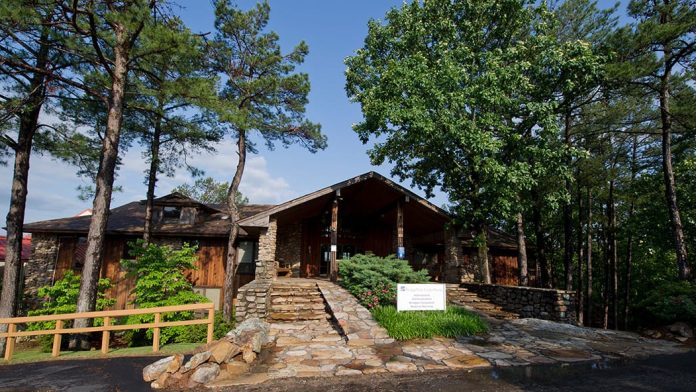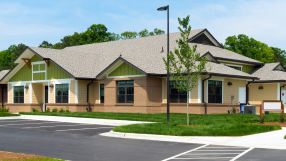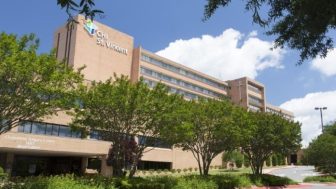The BridgeWay
21 Bridgeway Road
Arkansas, AR 72113

About The BridgeWay
Located in North Little Rock, Arkansas, the BridgeWay is a treatment center offering a full continuum of mental health services for children, adolescents, and adults dealing with mental health and substance use disorders. Offering inpatient, outpatient, and partial hospitalization programs on a 19 acre scenic campus surrounded by trees, the BridgeWay has over 40 years of mental health treatment experience.
BridgeWay’s team of mental health professionals includes board certified psychiatrists, masters level clinicians, therapists, nurses, and mental health associates who have the expertise to treat children, adolescents, and adults experiencing behavioral and substance use challenges. Patients can benefit from assessment and diagnosis, medication management, individual, group, and family therapy, nutrition counseling, recreation therapy, case management, and discharge planning. Amenities include a secluded campus in the wooded hills of Arkansas, individualized care, beautiful grounds, and contemporary accommodations.
Certified by the Joint Commission, and LegitScript, reflecting high quality healthcare, and transparency and compliance with healthcare standards. Most private, government, and state insurance plans accepted, including Medicare, Medicaid, and Tricare. BridgeWay also offers a range of payment options.
Amenities

Art Therapy
Art and music are mediums that connect with our feelings, making them a great recovery tool during addiction t...reatment. Studies show that combining art/music and drug rehab can have a greater therapeutic impact than drug rehab alone, as you’re able to access parts of your brain and body that you may not have access to during traditional talk therapy. Benefits of art/music therapy include lowering stress and anxiety, promoting healthy neurochemicals, and providing stress relief.
Day School
Addiction treatment programs provide an opportunity to get your life back on track with access to school class...es or college courses. Whether you want to finish your GED or go back to school to learn a new trade, facilities often enlist tutors and teachers who are certified or licensed by the state to oversee self-study or distance-learning education.
Private Rehab
Private drug rehab provides a comfortable, secure environment that allows you to focus on doing the work to ge...t your life back on track. Benefits include a higher staff-to-client ratio, increased one-on-one time with therapists and healthcare providers, private rooms for clients, and customized forms of therapy.
Yoga Studio
Treatment centers with a yoga studio offer a special form of holistic therapy during the recovery process. Yog...a boosts mindfulness, a sense of calm, and healthy reflection during drug rehab via breathing exercises, stretching, and a progression of specific postures.Addiction Treatment Programs
Adult Program
Adults aged 18 and older who struggle with substance abuse can attend an adult program in Arkansas to receive treatment for addiction. These programs provide intervention therapies that help the individual stop using and learn ways to stay clean.Alcoholism
For those whose lives have been derailed by alcohol use disorder, alcohol rehab in Arkansas offers hope. Through individualized treatment, these programs address alcohol dependency and help participants recover and begin living a healthy, sober life.Animal & Equine Therapy
Animal & equine therapy are evidence-based complementary therapies drawing on the emotional, psychological, and physiological benefits of regular contact with animals. Addiction recovery programs may incorporate the care of therapy dogs, cats, horses, and other animals into their treatment model to support clients’ development of recovery-focused life skills, including personal responsibility, time management, and empathy. Contact with therapy animals may reduce stress, enhance mood, decrease depression and anxiety, and increase clients’ self-esteem and sense of wellbeing.Cognitive Behavioral Therapy (CBT)
Often used to treat dual diagnosis disorders, cognitive behavioral therapy in Arkansas addresses disroders like PTSD, ADD, anxiety, OCD, and bipolar disorder, along with substance use disorders. This method helps individuals find connections between their feelings, thoughts, and actions and understand how those things affect their recovery.EMDR Therapy
EMDR Therapy is a neurobiological treatment modality used to address trauma disorders and related mental and behavioral health challenges. Short for eye movement desensitization and reprocessing, EMDR is designed to help clients cope with distressing memories and emotions, including fear, sadness, and anger. EMDR may help clients in addiction recovery manage the psychological and emotional triggers that contribute to substance misuse and/or addiction relapse.Men's Rehab
Men’s rehab in Arkansas is designed exclusively for males who are struggling with an alcohol or substance use disorder. Because men and women often respond better to different types of treatment, this targeted rehab can be more effective than mixed-gender treatment.Opioid Treatment
Arkansas residents who are addicted to opioids can find help at an opioid rehab in Arkansas. Opioid addiction is highly treatable with therapy and medication assisted methods. Treatment focuses on both physical and emotional aspects of the addiction.Senior Drug & Alcohol Rehab
Adults over the age of 65 have needs that differ from younger generations. Elderly rehab in Arkansas is tailored to meet these needs with specialized addiction treatment for seniors.Women's Rehab
For women, the experiences that lead to addiction are often very different than men. Women’s rehab in Arkansas addresses the way stress, trauma, genetics, and their environment affect women’s addiction challenges and recovery journey.Teen & Adolescent Program
An effective young adult program in Arkansas gives young people the skills they need to embrace recovery with confidence and the ability to make healthy choices. Treatment focuses on challenges specific to this age group.Levels of Care
Detox & MAT
Detox is typically the first step of drug rehab in Arkansas. Addictive substances are slowly removed from your... system, and you're monitored by medical professionals around the clock during the detox process.Inpatient Rehab
Inpatient rehab in Arkansas is designed primarily for clients exiting detox, people in early recovery, and tho...se at an elevated risk of relapse. Participants reside at the treatment facility until they complete their recovery program, which gives them access to medical providers and therapeutic tools. .Partial Hospitalization Program (PHP)
Partial hospitalization programs (PHPs) in Arkansas allow residents to live at home while receiving this speci...alized type of outpatient treatment at a drug rehab facility. PHPs are best suited for those who don’t need emergency intervention or continuous medical supervision to treat substance use disorder.Outpatient Rehab
Many people in drug rehab in Arkansas transition to an outpatient rehab program after completing a residential... or partial hospitalization program. This transition allows them to return to their life and responsibilities while still meeting with recovery experts and attending support groups.Aftercare & Alumni Program
Once you’ve completed your initial rehab treatment, you’ll need additional support to prevent relapse. Thi...s is where aftercare rehab in Alaska steps in. Through continued access to counselors, support groups, and assistance with job-finding, education, and finances, you’ll get the support you need to maintain sobriety.Dual Diagnosis & Mental Health
Many people who struggle with addiction also experience co-occurring disorders such as depression or anxiety. ...Dual diagnosis programs in Arkansas specialize in treating both disorders, which is essential for recovery.Drug & Alcohol Intervention
Staff members offer intervention services as a way to help family members plan and facilitate interventions as... well as provide resources to develop a treatment plan. They also offer assistance with admission to drug rehab in Arkansas. This professional support can prove invaluable in guiding people toward the help they need.Accreditations

Joint Commission
Insurance
 Medicaid Accepted
Medicaid Accepted
(also known as Arkansas Health and Opportunity for Me Program): If you’re struggling to pay for rehab, you m...ay be eligible for Medicaid. Coverage varies, but can help pay for alcohol and drug rehab in Arkansas.
 Medicare Accepted
Medicare Accepted
Arkansas Medicare may have coverage options available to assist you with the cost of alcohol and drug rehab in... Arkansas. The amount of coverage will depend on many things, including whether you are seeking inpatient or outpatient treatment for substance abuse.
 TRICARE
TRICARE
Administered by the Department of Defense, TRICARE offers comprehensive military health insurance plans for ac...tive and retired military members and their families. Similar to PPO programs offered by private insurance companies, TRICARE covers multiple levels of care for addiction treatment, including detox, inpatient rehab, and outpatient services.
 Private Insurance
Private Insurance
If you have a private insurance policy, it can significantly lower the cost of alcohol and drug rehab in Arkan...sas. The coverage tends to vary based on specific rehab insurance terms, and you may be left with out-of-pocket costs like a copayment or co-insurance. Check with your insurer for more information.
 Self-Pay Options
Self-Pay Options
Self-pay options for drug rehab in Arkansas, also known as private pay, let you pay out-of-pocket or via perso...nal or medical loans. There are usually different fee structures for different levels of care.Contact The BridgeWay

Location Details
Other Nearby Facilities

1857 Rice Street
Waldron, AR 72958

2 Street Vincent Circle
Little Rock, AR 72205

308 East Adams Street
Hamburg, AR 71646

1104 N 2nd St
Rogers, AR 72756